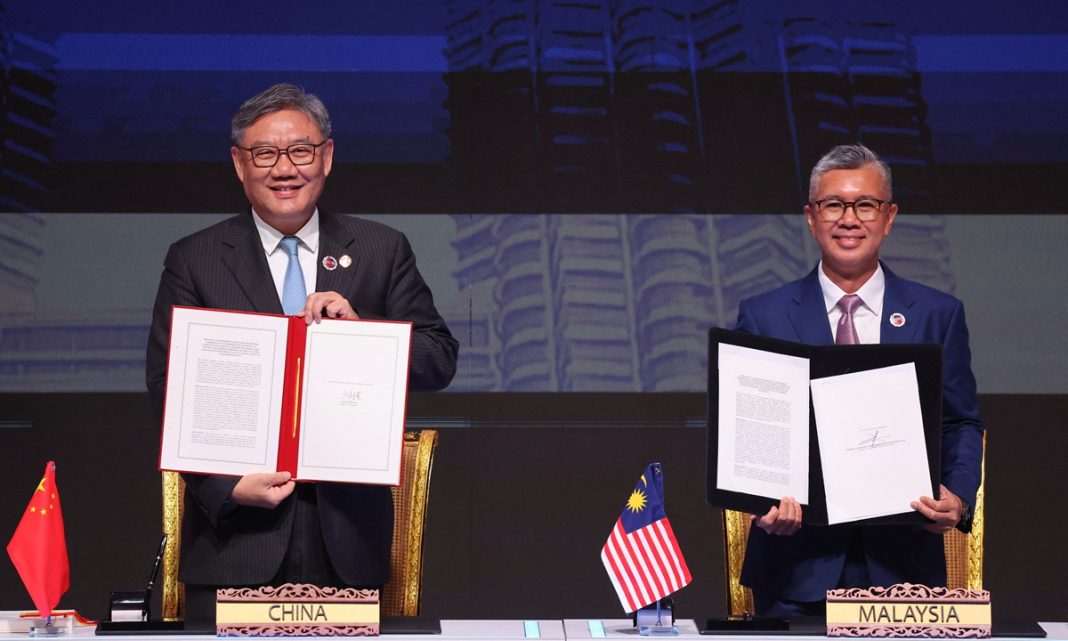
BEIJING: China and ASEAN on Tuesday officially signed the upgraded China-ASEAN Free Trade Area (FTA) 3.0 Upgrade Protocol, marking a major step forward in regional economic integration and injecting confidence and momentum into global economic growth.
According to China’s Ministry of Commerce (MOFCOM), witnessed by Chinese Premier Li Qiang, Malaysian Prime Minister Anwar Ibrahim and other ASEAN leaders, Chinese Commerce Minister Wang Wentao and Malaysian Minister of Investment, Trade and Industry Tengku Zafrul Abdul Aziz signed the China-ASEAN FTA 3.0 Upgrade Protocol on behalf of China and ASEAN respectively in Kuala Lumpur, Malaysia.
The MOFCOM said the upgrade of the China-ASEAN FTA 3.0 fully embodies both sides’ solemn commitment to jointly uphold multilateralism and free trade, as well as their firm determination to build an open, inclusive, rules-based regional integrated market and a mutually beneficial, win-win, and resilient regional industrial and supply chain system.
It will create abundant market and industrial cooperation opportunities for enterprises in both regions and beyond, inject confidence and momentum into regional and global economic growth, and serve as an important model for countries to jointly address international economic and trade challenges, the MOFCOM noted.
The 3.0 Upgrade Protocol covers nine major areas, adding five new ones: digital economy, green economy, supply chain connectivity, competition and consumer protection, and support for micro, small and medium-sized enterprises. The two sides will now complete their respective domestic approval procedures to ensure the protocol takes effect as soon as possible, according to the MOFCOM.
The Protocol builds on the China-ASEAN FTA 1.0 and 2.0 as well as the RCEP framework. According to MOFCOM, it features three major highlights. It expands cooperation into emerging areas by adding five new chapters on the digital economy, green economy, supply chain connectivity, competition and consumer protection, and micro, small and medium-sized enterprises (MSMEs) – marking a breakthrough in China-ASEAN trade practice and reflecting both sides’ shared commitment to advancing international trade rules.
It also raises the overall level of openness, setting the most ambitious commitments yet in goods, services and investment while establishing a comprehensive framework that links traditional “at-the-border” facilitation with “behind-the-border” cooperation in digital, green and supply chain sectors, injecting new momentum into regional growth, according to the ministry.
In addition, the Protocol promotes inclusive development by including competition, consumer protection, MSME support and technical cooperation, ensuring fair competition, protecting consumer rights, and helping less-developed members enhance capacity so that all can share in the benefits of regional growth, the MOFCOM said.
“The signing of the Upgrade Protocol is a milestone in regional integration,” Liao Bin, executive chairman of the ASEAN-China Association for the Promotion of Industrial Cooperation and Development, told the Global Times. “By emphasizing digital, green, and supply chain cooperation, the agreement focuses on areas with the greatest potential for shared growth,” Liao added.
Loh Wee Keng, chairman of the Malaysian Chamber of Commerce and Industry in China, told the Global Times that the signing of the Upgrade Protocol injects new momentum into regional growth by strengthening multilateralism, reducing trade barriers and creating a more stable environment for businesses across the region.
Loh highlighted the digital economy and supply chain connectivity as the two most notable aspects of the deal. The digital economy, he said, will reshape industries across the board, while closer supply chain integration will advance trade and investment flows within ASEAN. For Malaysian enterprises, the upgraded protocol opens new opportunities for collaboration with Chinese digital firms and allows small and medium-sized enterprises easier, lower-cost access to the Chinese market.
Zhou Shixin, director of the Institute for Foreign Policy Studies at the Shanghai Institutes for International Studies, told the Global Times that the upgrade marks a shift from traditional trade and investment toward a new phase driven by advanced technology and deeper industrial integration. He said closer cooperation in frontier sectors such as semiconductors will help both sides achieve higher-quality growth.
“For ASEAN, China represents a vital opportunity for development; for China, ASEAN is an indispensable partner,” Zhou said, noting that the upgraded framework enables both sides to expand market scale, boost investment and job creation, and accelerate industrial upgrading that benefits businesses and people across the region. –The Daily Mail-Global Times news exchange item




